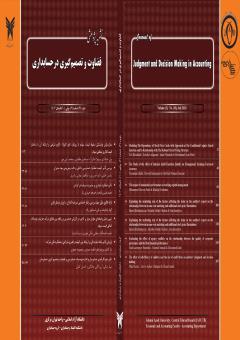Provide a Causal Model to Investigate the Emotional Behavior of Investors According to the Fuzzy Dematel Method
Subject Areas :elham bahaghighat 1 , ali esmaeilzade 2 *
1 - tehran
2 - tehran
Keywords: Behavioral finance, mass behavior, culture, behavioral personality, emotional behavior of investors,
Abstract :
Today, the feelings of investors are recognized as one of the influential factors in the flow of capital as well as the general movement of the stock market; So that the flow of capital to investment funds is mentioned as one of the indicators for assessing market sentiment. In fact, investors with little information are more likely to make new investments or withdraw from previous ones based on emotions. The aim of this study was to provide a causal model to investigate the emotional behavior of investors with respect to the fuzzy Dematel method. This research is descriptive in nature and content. In this research, information about 15 professors and capital market experts is the statistical sample. The results of this study showed that the four main factors of behavioral finance, behavioral personality, mass behavior and culture affect the emotional behavior of investors. Also, Dematel method showed that the mass behavior factor with an average of 18.740, the culture factor with an average of 9.497 and the behavioral financial factor with an average of 8.742 are among the influential factors. On the other hand, the behavioral personality factor with an average of 14.975 is considered as an influential factor.
فهرست منابع
علی نژاد، س.، رهنمای رودپشتی، ف.، و رضایی، ف. (1400). آزمایش محتوای اطلاعاتی تحت تأثیر رفتار احساسات سرمایه گذاران و کیفیت گزارشگری مالی. مجله دانش سرمایهگذاری، 11(44)، 103-125.
احمدی، م.، محمد رمضان، قلمبر، درسه و سیدصابر. (1398). بررسی تأثیر معیارهای بیش اعتمادی مدیران ارشد بر ریسک سقوط آتی قیمت سهام در شرکت های پذیرفته شده در بورس اوراق بهادار تهران. تحقیقات حسابداری مالی و حسابرسی، 11(41)، 93-124.
ابراهیم پور حبیب اله، روشن دل اربطانی طاهر و امیری عبدالرضا.(1402) عوامل نگرش مؤثر در تبیین اعتماد عمومی به پلیس (مطالعه موردی: پلیس تهران). فصلنامه تحقیقات مدیریت مدیریت، 7(3)، صص 327-301
حسنی. (1401). تأثیر محرکهای احتمالی خطر دادرسی ناشی از اشتباهات و اعوجاج در گزارشگری مالی مالکان بر تعدیل اظهارنظر حسابرسی. قضاوت و تصمیم گیری در حسابداری و حسابرسی، 1(3)، 125-165.
حیدرپور، ف.، فرزانه، تاری واردی، یاد اله و محرابی. (1397). تأثیر تمایلات هیجانی سرمایه گذاران بر بازده سهام. دانش مالی تحلیل اوراق بهادار، 6 (شماره 1 (17 متوالی))، 1-13.
قربانی، پورطاهر اقدم، فرزانه و رهنما رودپشتی. (1401). تاثیر محافظه کاری حسابرس و عدم قطعیت سیاست اقتصادی بر کیفیت سود. قضاوت و تصمیم گیری در حسابداری و حسابرسی، 1(2)، 1-25.
نایب محسنی، س.، خلیفه سلطانی، س.ع.، و حجازی، ر. (1400). تدوین مدل رفتاری تصمیم گیری سرمایه گذاران انفرادی در بازار سرمایه ایران. مجله تحقیقات مالی، 23(4)، 625-652.
جهانشاد، ع.، ملکیان، ح.، و حمزه. (1396). نقش اعتماد بر واکنش سرمایه گذاران به اعلام سود با تاکید بر الزامات نهادهای رسمی و عدم تقارن اطلاعاتی. تحقیقات حسابداری و حسابرسی، 7(26)، 92-107.
رجب دری، وکیلی فرد، سالاری و امیری. (1401). رابطه بین نظریه های اخلاقی و رفتار اخلاقی در قضاوت حسابرسان. قضاوت و تصمیم گیری در حسابداری و حسابرسی، 1(1)، 113-142.
رضایی، ف. (1392). بررسی رابطه بین قیمت سهام و متغیرهای حسابداری در مراحل چرخه عمر شرکت با استفاده از تحلیل بیزی سلسله مراتبی. مجله تحقیقات حسابداری مالی، 5(2)، 109-126.
سرلک، ک.، علیپور، وکیلی فرد. (1394). تأثیر متغیرهای تصمیم گیری هیجانی و تکنیک بنیادی سرمایه گذاران بر بازده سهام در بورس اوراق بهادار تهران. دانش مالی تحلیل اوراق بهادار، 5(شماره 4 (متوالی 16))، 1-12.
سیف الهی، کردلوی و دشتی. (1399). بررسی تطبیقی عوامل رفتاری در سرمایه گذاری دارایی های مالی. دانش سرمایه گذاری، 4(15)، 33-52.
Aissia, D. B. (2016). Home and foreign investor sentiment and the stock returns. The Quarterly Review of Economics and Finance, 59, 71-77.
Ahmed, S., & Ullah, N. (2013). Investor sentiment and stock market dynamics: A case of Pakistan. Journal of Public Administration, Finance and Law, 4(4), 126-135.
Baker, M., & Wurgler, J. (2020). Investor sentiment in the stock market. Journal of economic perspectives, 21(2), 129-152.
Dinda, S. (2008). Social capital in the creation of human capital and economic growth: A productive consumption approach. The Journal of Socio-Economics, 37(5), 2020-2033.
Chen, W. J. (2013). Can corporate governance mitigate the adverse impact of investor sentiment on corporate investment decisions? Evidence from Taiwan. Asian Journal of Finance & Accounting, 5(2), 101.
Dalika, N. K., & Seetharam, Y. (2014). Sentiment and returns: Analysis of investor sentiment in the south African market (Doctoral dissertation, University of the Witwatersrand, Faculty of Commerce, Law and Management, School of Economic and Business Sciences).
Khan, J., Etebari, A., & Wisniewski, T. P. (2022). The effect of investors' personality characteristics on their investment decisions with the mediating role of financial self-efficacy and emotional biases and the moderating role of need for cognition and individual mood in Pakistan Stock Exchange. Journal of Banking & Finance, 36(3), 835-845.
Rajerz, Y. & Polak,. (2021). Three simple models of social capital and economic growth. The Journal of Socio-Economics, 35(5), 889-912.
Wang, Y. M., Li, C. A., & Lin, C. F. (2021). T The effect of the day of the week and stock returns with the emotional orientation of investors in the Chinese stock market. International Research Journal of Finance and Economics, 28, 134-151.
Wu, X., & Wang, Z. (2005). Equity financing in a Myers–Majluf framework with private benefits of control. Journal of Corporate Finance, 11(5), 915-945.
Zhu, B., & Niu, F. (2019). Investor sentiment, accounting information and stock price: Evidence from China. Pacific-Basin Finance Journal, 38, 125-134.
Zouaoui, M., Nouyrigat, G., & Beer, F. (2016). How does investor sentiment affect stock market crises? Evidence from panel data. Financial Review, 46(4), 723-747.

